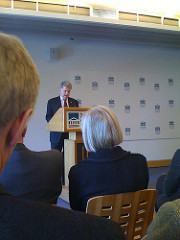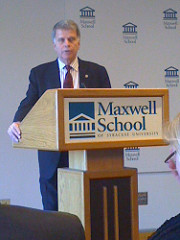David S. Ferriero, Archivist of the United States, spoke at
Syracuse University on March 28 on the topic of "Protecting National Security in an Open Government Environment: the Role of the
National Archives". What follows are my notes, which I hope capture his comments, as well as the Q&A, accurately. I wish I could have typed faster which he delivered his prepared remarks, because I know I missed valuable information.
Piece of trivia, Ferriero has three letters (reproductions) on the wall of his office that he wrote to three of our presidents (Eisenhower, Kennedy and Johnson). David Stam, who introduced Ferriero, remarked at the ability of the National Archives to locate them.
Ferriero is pleased at the progress that has been made in terms of making archival materials available to the public. He hopes that people will avail themselves of the Archives' 44 locations across the U.S.
Several federals acts have strengthened the role of the Archives over the years. The amount of information collected is staggering, including electronic records. (Ferriero noted later how little of created content the Archives actually collects.)
President Obama launched the open government initiative on his first day in office. The Archives wants to open as many doors (and windows) to the Archives as possible. Make more information available and in more efficient ways. They are not waiting for people to come to the Archives, instead they are using social media to go to where people are online and put content there for them to find. (Note the social media links on the Archives homepage.)

The are engaging the public as citizen archivists, in recognition that we (the public) can strengthen the holdings of the Archives. We may view items differently that those that work at the Archives, and see information that others have ignored (e.g., war plans written in Russian). Every day new discoveries are made. This collaboration between staff and citizen researchers is crucial. (He talked about this again later in response to a question.)
He said there is a delicate balance between providing documents to people versus protecting national security. Three groups work within the Archives on this:
- The Office of Government Information Services (OGIS) - They handle FOIA requests.
- The National Declassification Center - Its job is to eliminate the backlog of documents waiting to be declassified. Looking at those type of documents that people are most interested in first (e.g., UFOs and the Kennedy assassination). At the moment, they are trying to make wholesale decisions on boxes, etc. The web site will tell you what records are currently classified.
Looking at 32 CFR Parts 2001 and 2003 Classified National Security Information; Final Rule (after his talk) the types of records mentioned are:
(A) Military plans, weapons systems, or operations;
(B) Foreign government information;
(C) Intelligence activities (including covert action), intelligence sources or methods, or cryptology;
(D) Foreign relations or foreign activities of the United States, including confidential sources;
(E) Scientific, technological, or economic matters relating to the national security;
(F) United States Government programs for safeguarding nuclear materials or facilities;
(G) Vulnerabilities or capabilities of systems, installations,
infrastructures, projects, plans, or protection services relating to the national security; or
(H) The development, production, or use of weapons of mass destruction.
- Information Security Oversight Office (ISOO) - There are more than 2000 classification guides used by the U.S. government. Among this ISOO's work is to "standardized [controlled unclassified information] policies and procedures that appropriately protect sensitive information through effective data access and control measures."
In order to make more information available, they are working with volunteers who are willing to digitize records. The Archives has the equipment, but people are needed to operate it.
[Comments below this are from the Q&A]
Question: With the problems we've seen oversees, what is the Archives doing to ensure the records remain safe? They have 44 facilities, which helps. Yes, there are vaults. The most critical documents are highly protected. He does not see a time when all of the content of the Archives will be digitized.
Ferriero has visited 27 of the facilities to talk to employees. One of the issues that arises is always that people feel disconnected. What can they do to ensure that all of the employees feel as if they belong to one organization? Can the Archives look outside itself and learn from others? Can it use social media to engage its employees? Can it learn the emerging tools so it can advise others? Can they eliminate duplicate processes? He is getting the staff involved in generating ideas and help create the "new agency".
What is the impact of Wikileaks? It is an interesting heads-up. Surprised that it hadn't happened sooner. A large number of people have access to the system where the information lived. There is a lot of discussion (ISOO is included in it) to find solutions without "throwing the baby out with the bath water."
The ISOO staff are Archives staff - archivists and former national security personnel. The only two criteria for keeping documents classified are national security and weapons of mass destruction. (See list above for more details.)
We know that the records of the Archives are not complete. How does that influence Ferriero? In the past, records have been lost due to fire, theft, etc. The real problem now are electronic records. There is a high risk around those records because the digital environment is unstable. Some records stay in an agency for 30 years before being sent to the Archives. 30 years in an unstable environment?!
Question about items missing from the Archives. While it hit the news in the last year, it was old news. Must be vigilant. They have a records protection team to educate staff and put processes in place, e.g., checking people's bags when they leave a facility.
It is not just stealing stuff, but changing items that belong to the Archives. One person allegedly changed a date on a pardon given by President Lincoln.
A government agency can approve the release of information. It may not be the entire document, but may be a dedacted version of the document.
How do we compare to other countries? In his response he mentioned the
International Council on Archives (ICA). In terms of practice, we're close to those of Canada and the UK. In terms of electronic records, we're slightly ahead of our peers.
Is there concern about federal records that may be in a private archive? They do have legal staff that spends time tracking down documents that belong in the National Archives. Documents sometimes show up on eBay and in other places.

Is there an advocate in the system for throwing things away? No. The Archives only ends up with 1-3% of the records that are created. Every agency has schedules for what is kept and what is sent to the Archives.
Queston about Ancetry.com. Ancentry has a lock on the content for five year, then people can use it for free on the Internet from anywhere. Content is available at the various Archive locations.
Citizen archivists are researchers (not archivists) who are using the Archives records and then telling the Archives what they are discovering that the Archives should know about.
The Archives budget has been cut. David Ferriero has been working to educate Congress on the role of the Archives and its contents.
Between his comments and the Q&A, David Ferriero spoke for just over one hour. The was a good turn out for the event from across campus and the event was recorded so that others can view it later. I am not sure, however, when or how the recording will be made available. (I'll try to follow-up on that.)